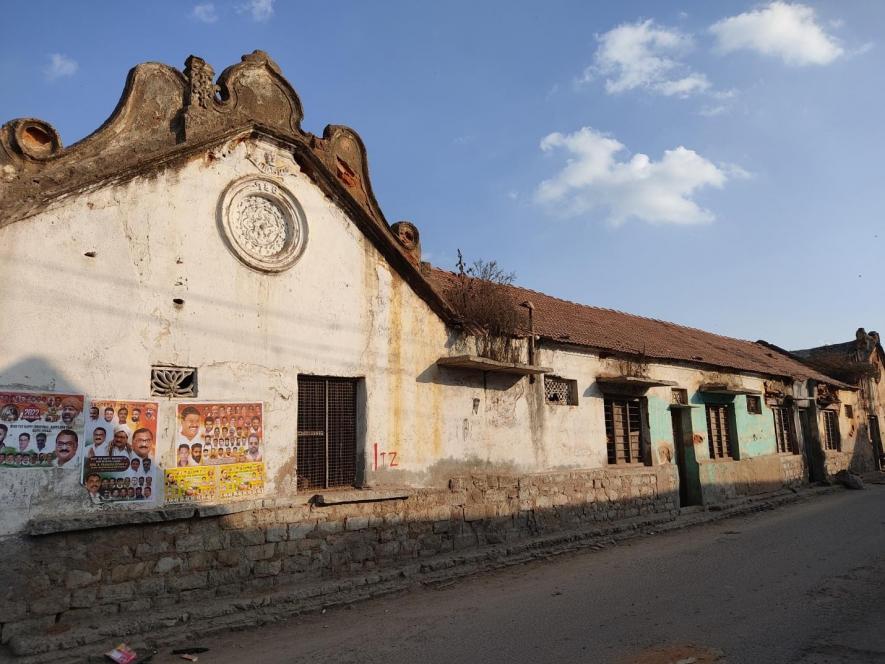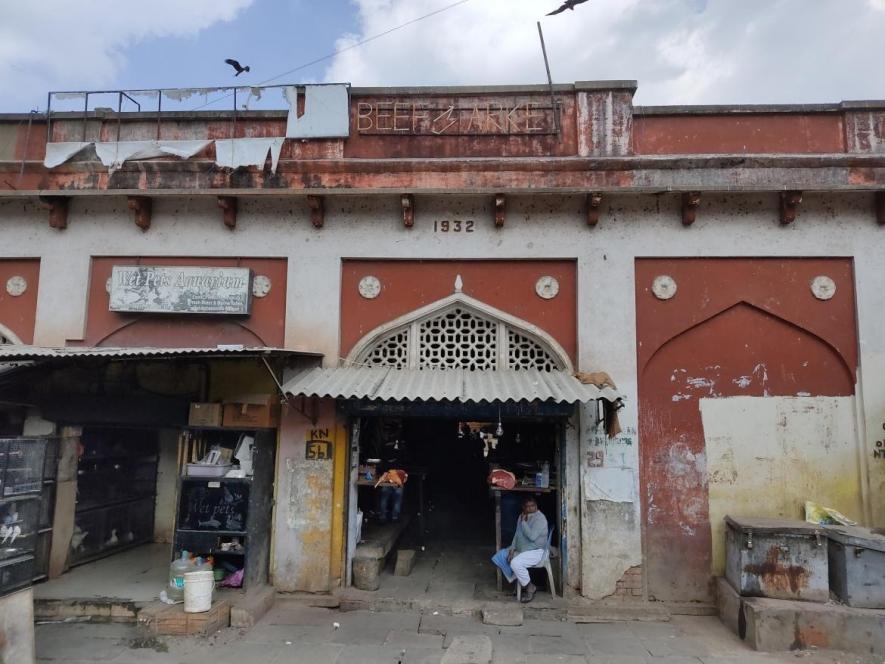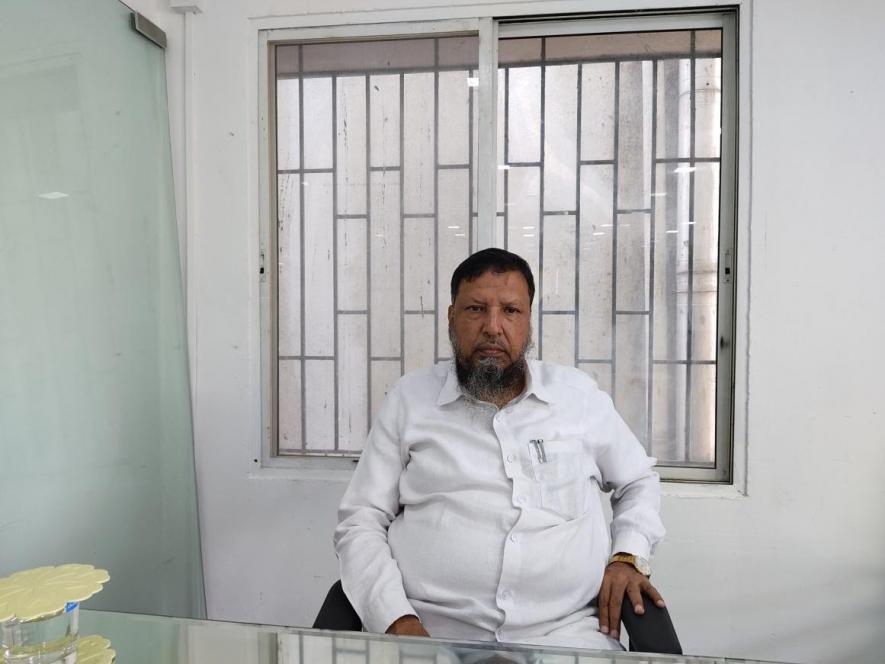Karnataka Cattle Slaughter Ban Culls Livelihood of Informal Workers

Devara Jeevanahalli, north Bengaluru.
Around 100 metres into Shampura Main Road, adjoining Tannery Road in east Bengaluru, is a defunct warehouse with the British crown symbol and the date ‘1.10.1914’ atop. A sombre Mohammed Aamir (65) manages his woodenware shop, located at the junction opposite the warehouse. Once the owner of a leather footwear shop, he shut it down after the Bharatiya Janata Party (BJP) enacted the Karnataka Prevention of Slaughter and Prevention of Cattle Act, 2020, which came into effect in February 2021.
Blow to the Leather industry
The Act was a “severe blow” to the livelihood of Muslims, says Amir. Devara Jeevanahalli, or DJ Halli, was home to the city’s oldest abattoirs, and curing units, which bought hide from the government slaughterhouse on Tannery Road and supplied them to the tanneries even in Tamil Nadu. Over a period of time, the tanneries in Karnataka shut down and the curing units became completely dependent on the demand from Tamil Nadu.
Once the largest skin business owner on Tannery Road, Ehsaan Rizwan was severely impacted by the sweeping ban, which left the informal working class—traders, workers, cattle transporters, skinners and tanners—bleeding. Approximately, 3.5 lakh Dalits, who constituted the core of the curing and tanning industry, were suddenly without a livelihood and forced to switch jobs.
The pandemic was the final nail in the coffin for the leather industry. As per the state’s 2020-2021 Economic Survey, from Rs 521.81 crore in 2017-18, Rs 562 crore in 2018-19 and Rs 502 crore in 2019-20, leather exports plunged to Rs 166.84 crore in 2020-21 (April-November).
Impact on the Beef market
The state’s beef industry, valued at Rs 500 crore and employing nearly 40 lakh families, was the next to be affected.

The Shivaji Nagar beef marker in Bengaluru.
The once-bustling Shivaji Nagar beef market now wears a deserted look. The number of shops, which employed three persons each, has tanked from 58 to 16.
One of the shop owners Gafoor Khan (55) feels that the law, which bans slaughtering buffaloes under 13, is responsible for the drastic drop in sales at the city’s oldest and biggest beef market. “Customers don’t prefer old buffalo meat. The generations-old beef business is doomed,” says Khan.
The Johnson Market has a similar story with only 4 out of 15 beef shops remaining. Besides affecting the nearly 2,000 men employed at Shivaji Nagar and Johnson Market, the Act has impacted the city’s daily consumption of 25 tonnes of beef.
The Bangalore-based Jamiat-ul-Quresh Beef Merchants Charitable Trust, an organisation representing the state’s butchers and based in Bengaluru, has challenged the law in court. “The BJP is misleading society in the name of the cow. What is the point is passing a new law when the slaughter of cows and calves is completely banned under the Karnataka Prevention of Cow Slaughter and Cattle Preservation Act, 1964?” asks Khasim Shoaib-ur-Rehman Qureshi, state president of the Trust.

Khasim Shoaib-ur-Rehman Qureshi, state president, Jamiat-ul-Quresh Beef Merchants Charitable Trust.
We sell bullock, ox and buffalo meat in the state. No cow meat is sold here. But selling only buffalo meat in the future will not meet the demand due to the lack of enough buffaloes in the state,” Qureshi adds.
More stringent than the 1964 Act, the new law is more like a complete anti-bovine slaughter order banning even the slaughter of buffaloes. Even the quantum of punishment for violators is more severe with minimum three-year imprisonment that can extend to seven years as against six months under the 1964 Act. The new law also provides for the “protection of persons acting in good faith” indirectly shielding cow vigilantes to target Muslims and Dalits involved in the trade and transport of cattle in Karnataka.
Assault on Right to Food
According to AJ Khan, state president, Dalit Minority Sene, eating beef was part of the food culture of Dalits, Muslims, Christians and Adivasis of Karnataka. “The blanket ban is an assault on the right to food. In rural Karnataka, eating beef daily is more common among Dalits because it is affordable. In Bengaluru, beef is significantly cheaper than mutton. One kg of beef costs between Rs 240 and Rs 300 while mutton costs Rs 700 or more. The law must be scrapped,” he says.
Public health and nutrition expert Sylvia Karpagam says the poor, who cannot afford the amount of milk, dry fruits and different pulses consumed by the rich, “can only get qualitative protein from something like beef, which is far cheaper than other meats and vegetarian diet”.
According to data, around 15% of Indians, including Dalits, Muslims, Christians, Other Backward Classes and Adivasis, consume beef. It is a valuable source of nutrition as 100 gm of lean beef provides almost 54% of the daily protein requirement.
A November 2021 report prepared Karpagam and co-researcher Siddharth Joshi pointed out how the Act severely affected Dalits and Muslims employed in the leather industry and even farmers.
Impact on Farmers
Farmers sell their cattle for several reasons, including droughts, diseases, reproductive disorders, low market price and due to the rapid mechanisation of agriculture. They usually sell unproductive cattle to traders, who transport them to slaughterhouses. The law prohibits farmers from selling unproductive cattle.
As per the research report, Majore, a Lingayat farmer from Kalaburagi Taluka, said: “You expect us to take care of the cattle till the end of their life. How will we manage? No one buys dead animals. We have to pay an extra Rs 2,000 to get a JCB to dispose of dead animals. Why are you harassing people purchasing cattle for the right amount of money?”
JM Veerasangaiah, state leader of Karnataka Rajya Raitha Sangha, explains the dire situation in rural areas. “Cattle which have outlived their utility for a farmer are usually sold at local fairs and eventually find their way to slaughterhouses. The modest proceeds from such sale helps the farmer in times of distress,” he says.
“Farmers should not be burdened with maintaining animals past their productive life—they can neither be used for farm work nor maintained. They are of no use to farmers. After bearing five or six calves, a cow’s milk yield falls and the returns don’t justify the costs of feeding and maintenance,” Veerasangaiah adds.
The writer is an independent journalist.
Get the latest reports & analysis with people's perspective on Protests, movements & deep analytical videos, discussions of the current affairs in your Telegram app. Subscribe to NewsClick's Telegram channel & get Real-Time updates on stories, as they get published on our website.
























